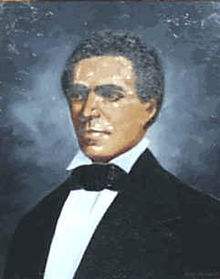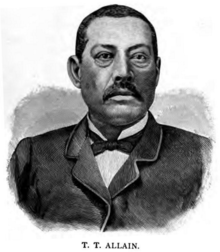John Brown Russwurm (October 1, 1799 - June 17, 1851) was born to an enslaved Jamaican mother and British father, with whom he emigrated to Maine in 1812. He graduated from Bowdoin College in 1826, the third known African American college graduate. He co-founded the abolitionist newspaper Freedom's Journal, the first paper owned and operated by African Americans, before emigrating to Liberia where he governed the Maryland Colony and edited the Liberia Herald.
Birthdays
Fannie M. Richards (October 1, 1840 - February 13, 1922) studied in Germany with Professor Wilhelm Forebel who developed the idea of kindergarten and taught in the Detroit public schools for 50 years. She was the first kindergarten teacher and the first African American teacher. She led the successful protest to integrate Michigan schools in 1871. She also founded the Phyllis Wheatley Home for elderly African American women and was its first president.
Theophile T. Allain (October 1, 1846 - February 2, 1917) was a member of the Louisiana State Legislature in the 1870s and 1880s. His politics focused on education and development and he was instrumental in the updating of Mississippi River levees in the 1880s. Later in his life he moved to Chicago and he remained active in civil rights. He was, for a time, the wealthiest black person in Louisiana. He was frequently associated with educational causes and with Booker T. Washington. In 1886, he secured $14,000 in a bill for the foundation of Southern University, and along with P. B. S. Pinchback and Henry Demas is considered a founder of that University. He was the first person after the US Civil War to organize integrated public schools in Baton Rouge.
Virginia Proctor Powell Florence (October 1, 1897 - 1991) was the first African American woman with a formal education in library science (Pitt, 1923) and to pass the New York high school librarian's examination. She worked in New York City and Washington DC schools, interrupting her career when her husband, Charles W. Florence (shown here at their wedding) was named president of Lincoln University in St. Louis.
James Earl (Jimmy) Carter (born October 1, 1924) followed Lester Maddox as Governor of Georgia, saying in his inaugural speech, "I say to you quite frankly that the time for racial discrimination is over." During his 1976 campaign for the presidency his backers included Andrew Young and Barbara Jordan, the first black members of Congress from the South since Reconstruction. Young helped nominate Carter and Martin Luther King Sr. delivered the closing benediction.
George Carruthers (born October 1, 1939) attended the University of Illinois where he earned his BS in aeronautical engineering (1961), MS in nuclear engineering (1962), and PhD. in aeronautical and astronomical engineering (1964). He then began his career with the Naval Research Laboratory in Washington DC as a research physicist where his research has resulted in a number of patents in aerospace technology. He has also taught science education at Howard University and worked on STEM outreach to children in the DC area.
Donny Hathaway (October 1, 1945–January 13, 1979) was an American soul singer-songwriter and musician. Hathaway contracted with Atlantic Records in 1969 and with his first single for the Atco label, "The Ghetto, Part I" in early 1970, Rolling Stone magazine "marked him as a major new force in soul music." His collaborations with Roberta Flack scored high on the charts and won him the Grammy Award for Best Pop Performance by a Duo or Group with Vocal for the duet, "Where Is the Love" in 1973.
Rod Carew (born October 1, 1945) lined, chopped and bunted his way to 3,053 career hits. He played from 1967 to 1985 for the Minnesota Twins and the California Angels and was elected to the All-Star game every season except his last, winning seven batting titles. He used a variety of relaxed, crouched batting stances to hit over .300 in 15 consecutive seasons with the Twins and Angels, achieving a .328 lifetime average. He was honored as American League Rookie of the Year in 1967, won the league MVP 10 years later and was named to 18 straight All-Star teams.
Events
On October 1, 1851, William Henry (known as "Jerry") was arrested in Syracuse under the Fugitive Slave Law. The anti-slavery Liberty Party was holding its state convention in the city, and when word of the arrest spread, several hundred abolitionists including Charles Augustus Wheaton broke into the city jail and freed Jerry. The event came to be widely known as the Jerry Rescue. A total of 26 of the rescuers were tried for their actions, but only one was convicted. The suspects were bailed out by a number of people, including U.S. Senator and former governor of New York William H. Seward. Nine others, including Reverend Jermain Wesley Loguen, himself a fugitive slave, were charged, but fled to Canada.
Between October 1 and 4, 1867, for the first time in Alabama history African Americans vote in a statewide election. About 70,000 black men, the majority of voters in the election, called for a constitutional convention and elected an overwhelmingly Republican set of convention delegates, including 18 blacks. That convention produced Alabama's fourth constitution.
On October 1, 2000, the Catholic Church was enriched with another Saint. Saint Josephine Bakhita, born in Darfur (Sudan) in 1869, died in Schio (Italy) February 8, 1947, was canonized by the Pope in the Vatican, calling her Our Universal Sister. This amazingly strong women made it from an ill-treated slave to a unifying symbol for Catholics and women.
Photo Gallery
 |
| New York, Negro Theatre. James Hewlett in Richard III. Playbill, October 1, 1821. |
 |
| Miles Davis at the funeral of Jimi Hendrix, 1 October 1970, Renton, Washington |
 |
| Astronaut Michael P. Anderson, STS-107 payload commander shown on October 1, 2001. He perished in flight on February 1, 2003, when Space Shuttle Columbia disintegrated over northern Texas |
Publications
 |
| Jet Magazine, October 1, 1953 |
 |
| Jet Magazine, October 1, 1953 |
 |
| Jet Magazine, October 1, 1981 |
A True Likeness: The Black South of Richard Samuel Roberts, 1920-1936 Paperback – October 1, 1994 by Richard Samuel Roberts (Author), Thomas L. Johnson (Editor), Phillip C. Dunn (Editor).















No comments:
Post a Comment